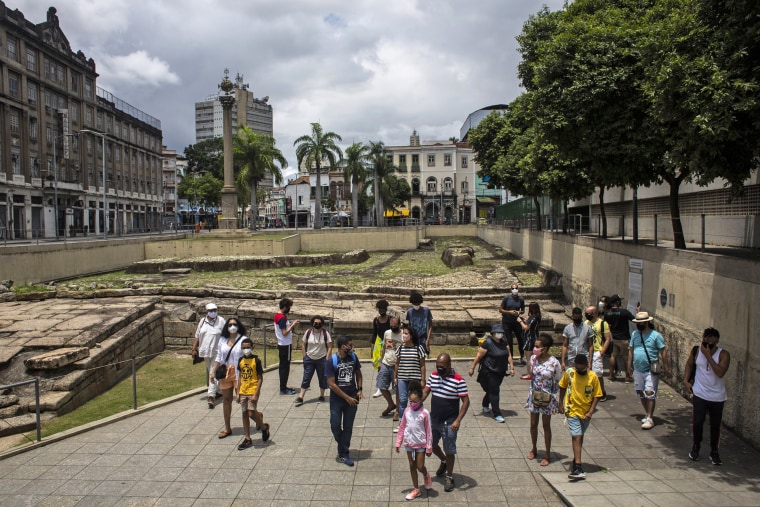Brazil confronts calls for reparations, grapples with slavery’s legacy
RIO DE JANEIRO — The executive manager for institutional relations at a Brazilian state bank took the microphone before roughly 150 people at a forum on slavery’s legacy in his country, which kidnapped more Africans for forced labor than any other nation.
“Today’s Bank of Brazil asks Black people for forgiveness,” André Machado said to the mostly Black audience at the Portela samba school in Rio de Janeiro.
“Directly or indirectly, all of Brazilian society should apologize to Black people for that sad moment in our history,” he said, reading a statement to audience members who sat watching from plastic chairs, their eyes fixed upon him.
Brazil — where more than half the population self-identifies as Black or biracial — has long resisted reckoning with its past. That reluctance has started loosening.
Public prosecutors have begun probing Bank of Brazil, Latin America’s second-largest financial institution by assets, with $380 billion, for its historical links to the slave trade. Their investigation could yield a recommendation, an agreement or filing of legal action, and they invited Bank of Brazil to start a dialogue with Black people at the Portela school in the working-class Madureira neighborhood.
Ghyslaine Almeida e Cunha, a spiritual leader of the Afro-Brazilian religion Umbanda, traveled from the Amazonian city of Belem for what she called “an historic moment.” She welcomed the apology and announcement of measures, though the bank stopped short of pledging compensation.
“I came to say — on Portela’s sacred soil — that, yes, we do want reparations,” said Cunha.
Brazil enslaved more people from Africa than any other country; nearly 5 million kidnapped Africans disembarked in Brazil, more than 12 times the number taken to mainland North America, according to estimates from the Trans-Atlantic Slave Trade database. Brazil was the last country in the Western Hemisphere to abolish slavery, in 1888.
Valongo Wharf in Rio, which UNESCO calls “the most important physical trace of the arrival of African slaves on the American continent,” was only excavated in 2011.

Discrimination remains, and Black and biracial Brazilians are more likely to be poor, imprisoned and die violently. Fewer than a third of managerial positions are held by those groups, and they comprise one quarter of representatives in Brazil’s Lower House of Congress.
On Dec. 7, a Senate committee heard experts arguing that Brazil needs to prioritize compensation. And when Carnival kicks off next week, a samba school parading before tens of thousands of spectators and millions more TV viewers will present the story of a Black man whose family is seeking reparations.
Brazil’s nascent clamor for reparations joins existing movements abroad. In the U.S., New York, California and Illinois have established task forces on the issue. In November, the African Union partnered with Caribbean countries to form a “united front” to persuade European nations to pay for “historical mass crimes”. Institutions such as Harvard University and the Bank of England have been confronting their historical ties to the slave trade, although neither has endorsed direct financial reparations.
And in 2021, President Joe Biden expressed support for a federal commission to study a national plan for reparations for Black Americans, but he has not supported any of the efforts at the state level.
Such discussions in the U.S. inspired Brazilian nonprofit Educafro to sue the federal government in May 2022, Irapuã Santana, the lawyer who filed the suit, told The Associated Press. The organization, which fights for better access to education for Black and biracial Brazilians, is demanding an apology and a fund to combat racism, among other measures.
Brazil long projected itself as a inclusive democracy that had left racism behind. Only in recent decades has there been a concerted effort to publicly debunk that myth. The country has so far mostly dealt with slavery’s legacy through affirmative action, particularly its 2012 law obliging public universities to reserve a certain number of spaces for Black people.
But many on the right argue the past is irrelevant, and deny that any compensation is due. They are likely to fight any widespread push for reparations.
“What debt? I have never enslaved anyone in my life,” Jair Bolsonaro said in a TV interview in 2018, months before he won the presidency. The former leader and current standard-bearer for the right has questioned the basis for quotas, saying Black and white people should be treated equally. In October, his son…
Read More: Brazil confronts calls for reparations, grapples with slavery’s legacy

